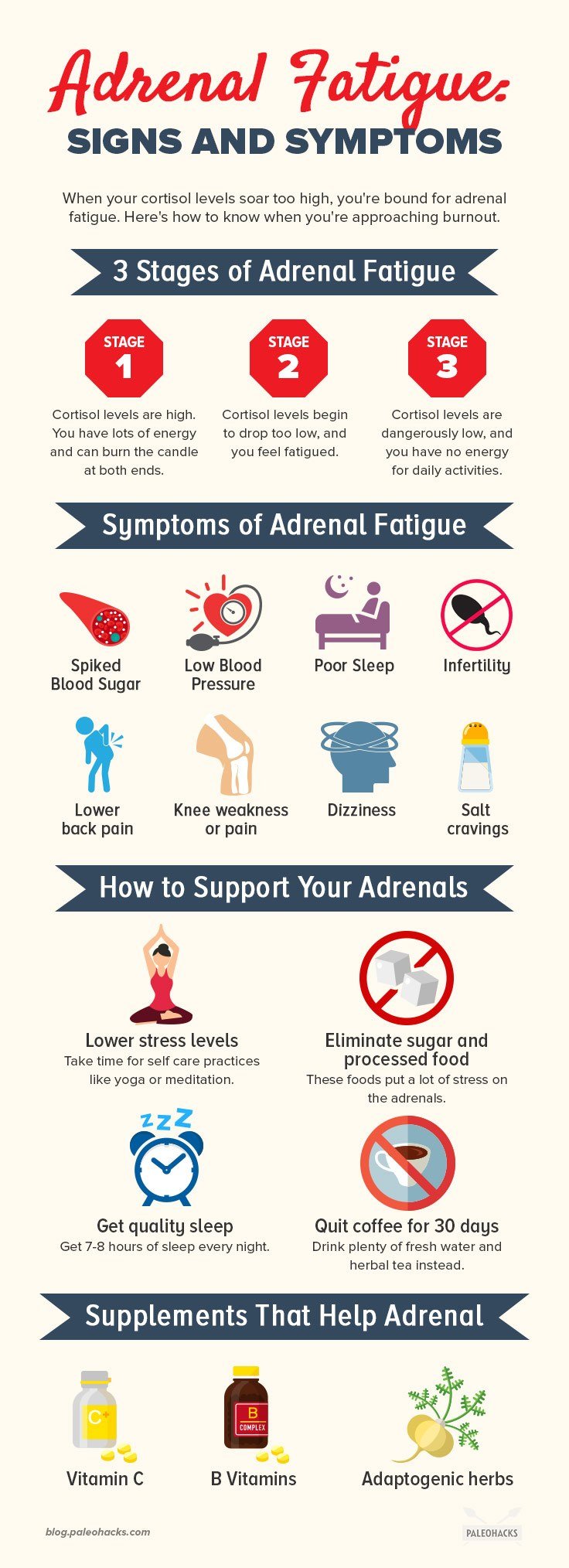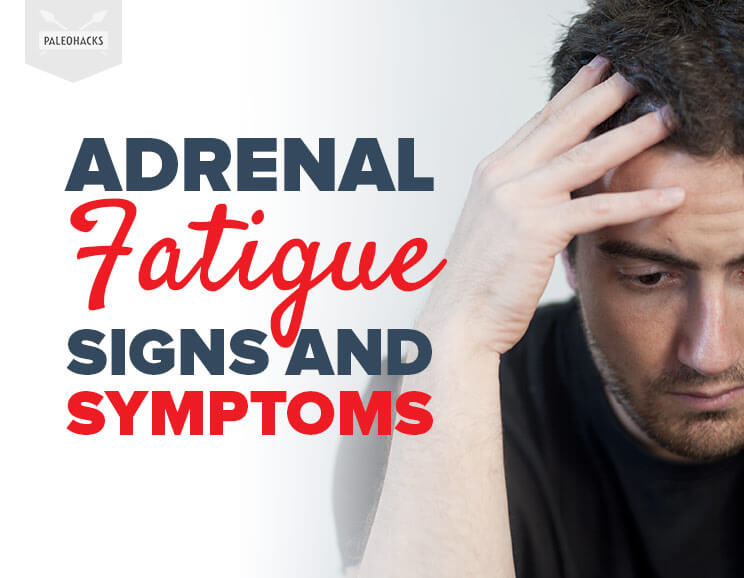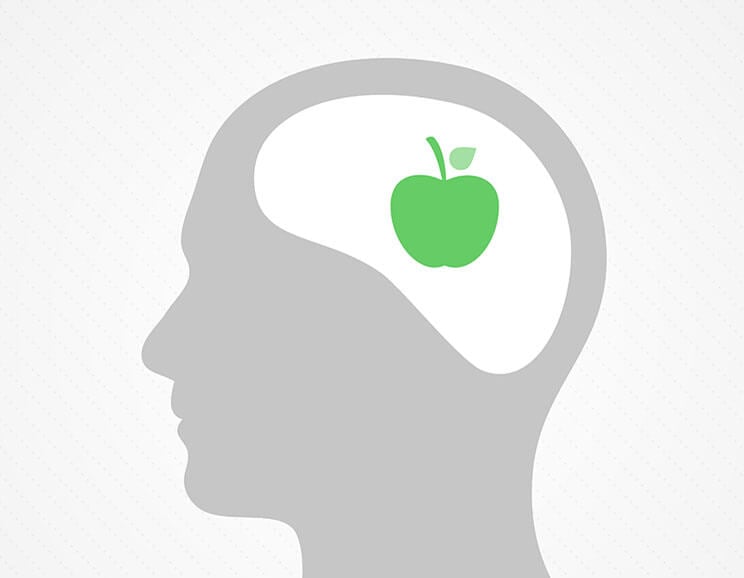When your cortisol levels soar too high, you’re bound for adrenal fatigue. Here’s how to know when you’re approaching adrenal burnout, and what to do about it.
Your hormones are essential for your store of energy. When your hormones are out of balance, your adrenal health suffers.
If you are under a lot of stress, there’s a good chance that your adrenals have weakened. Here’s how to tell if you have adrenal fatigue, and the best lifestyle changes you can make right now to readjust your cortisol levels.
Struggling to lose weight? Unable to focus? Chances are, your hormones are out of whack.
Grab Our FREE Guide To Fixing Your Hormones By Clicking Here!
3 Stages of Adrenal Fatigue
There are three major stages of adrenal fatigue:
Stage 1 – Cortisol levels are too high all the time. Many people feel good during this stage, have a lot of energy, and can burn the candle at both ends.
Stage 2 – If you don’t make any diet or lifestyle changes, you’ll eventually move into stage 2. At this point your cortisol levels will start to drop too low, and you will begin to experience fatigue and other symptoms.
Stage 3 – At this point, your cortisol levels are too low virtually all of the time. You will likely feel exhausted and have no energy to do the daily activities you’re used to.
How Adrenal Health and Gut Health are Related

Two of the most important adrenal hormones also help to regulate the digestive tract by strengthening the immune system and reducing inflammation. These hormones – cortisol and DHEA – are made throughout the body, but they are primarily produced by the adrenal glands.
Cortisol is the main anti-inflammatory hormone in the gut. If your cortisol levels are too high or low, you might experience chronic digestive issues due to the inflammation in the gut, which can also lead to inflammation in other areas of your body. [tweet_quote]Your most important adrenal hormones also help regulate your gut health.[/tweet_quote]
DHEA, the other adrenal hormone, is extra important for your immune system as it helps fight and prevent infections in your gut. We are exposed to pathogenic bacteria on a regular basis, and DHEA helps protect our bodies against them.
So, as you can see, having the right amounts of cortisol and DHEA is essential not only for healthy adrenals but for digestion and immune functioning.
Adrenal Fatigue Symptoms

Aside from gut health, cortisol is involved in a few other key body functions. Here’s how seemingly unrelated issues might actually indicate stress on the adrenals.
- Spiked Blood Sugar. Cortisol is linked to blood sugar regulation, so if your blood sugar is too high or low, it may be a sign of cortisol issues.
- Low Blood Pressure. If your blood pressure tends to be too low, that’s a good sign that your cortisol output is too low.
- Poor Sleep. If you have trouble falling asleep, staying asleep, or not feeling rested when you wake up, it could be a sign of cortisol dysregulation.
- Infertility. Adrenal hormones help regulate sex hormones. If you’re having difficulty getting pregnant, you may need to address your adrenals.
Other common adrenal fatigue symptoms include:
- Lower back pain
- Knee weakness or pain
- Feeling both “tired and wired”
- Excessive sweating from little activity
- Dizziness or light-headedness upon standing
- Muscle twitches
- Sensitivity to light
- Heart palpitations
- Easily irritated
- Salt cravings
- Chronic infections (bacterial, fungal, yeast)
- Excessive mood response after eating carbs
- Sweet, sugar, and carb cravings
- Premature aging
- Dry skin
- Low libido
- Easily startled
How to Support Your Adrenals

Restoring your adrenals is possible through lifestyle modifications, diet, and supplementation. First, it is critical to implement healthy lifestyle changes that help promote balance and reduce stress.
- Lower stress levels. Take time for self care practices like yoga or meditation. You can also try these restorative yoga poses for adrenal fatigue!
- Eliminate sugar and processed food. Processed carbs and sugar put a lot of stress on the adrenals. Eliminate gluten, dairy, and soy from your diet, as these foods tend to cause inflammation.
- Eat a natural, whole foods-based diet. Eat animal protein, healthy fats, vegetables, and fruits.
- Get quality sleep. Our bodies need 7-8 hours of quality sleep every night in order to strengthen the adrenals. Make it your goal to go to bed by 10pm every night.
- Quit coffee for 30 days. Coffee wears out your adrenals. Take a break by drinking plenty of fresh water and herbal tea in place of coffee for one month. After your coffee detox, limit yourself to one cup of coffee in the morning.
Supplements That Support the Adrenals

In addition to lifestyle changes, there are certain vitamins that can help boost adrenal health. Try to focus on eating more foods that contain these vitamins, or take them in supplement form.
Vitamin C
Vitamin C is directly related to cortisol output. In fact, Vitamin C is found in its highest concentration in the adrenal glands. Choosing a Vitamin C with Bioflavonoids can help aid in the absorption of Vitamin C.
B Vitamins
B vitamins are necessary for gut health and overall well-being. In particular, Pantothenic Acid, or B5, is important for the adrenal glands as it plays a role in creating every hormone in the body. Vitamin B5 also helps with anxiety, stress and the production of cortisol.
Adaptogenic Herbs
Herbs such as rhodiola, ginseng, cordyceps, and ashwagandha are all known to support the adrenals. These herbs are considered adaptogenic because they adapt to the state of your body and improve it. In other words, they will raise cortisol if your cortisol is too low, or lower it if it is too high.
The Bottom Line
If you’ve experienced any type of chronic stress (physical, mental, emotional) for a prolonged period of time, then I suggest getting your adrenals tested. Once you support your adrenals through diet, lifestyle, and supplementation, you can begin to heal your body, regain your energy, and feel vibrant again.

(Read This Next: 8 Signs You Have a Hormonal Imbalance and How to Fix It)



 Diet and Mental Health: What You Need to Know
Diet and Mental Health: What You Need to Know









Show Comments